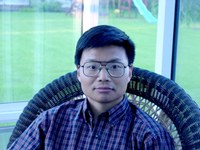Speakers 2022
|
|
Weinan E, Peking University |
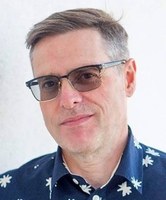 |
Mark Girolami, University of Cambridge Mark Girolami is the Chief Scientist of The Alan Turing Institute and took up this role from October 2021. Previous to his role as Chief Scientist he led The Alan Turing Institute-Lloyds Register Foundation programme in data-centric engineering which launched a whole new discipline that has global reach and influence. Under his leadership, the data-centric engineering programme (DCE) grew from an initial grant to a multi-million pound global research and innovation enterprise that saw the delivery of a number of ‘world-firsts’ including the world's first self-sensing 3D printed stainless steel pedestrian bridge in Amsterdam; sustainable and more efficient underground agriculture; advanced AI enabled city scale air quality monitoring systems; the city level monitoring of social distancing and activity assessment in guiding London through the COVD-19 pandemic; the development of an AI enabled UK Air Traffic Control Service, and digital twin technologies in rail transportation and aerospace design, amongst many others. The launch of the international Data-Centric Engineering journal by Cambridge University Press firmly established DCE as a new emerging discipline of global importance. Mark was also the driving force behind the first-ever DCEng Summit in September 2021. The event attracted international expert speakers from countries around the globe and represented a landmark moment in the growth of the discipline. In 2019 Mark Girolami was elected to the Sir Kirby Laing Professorship of Civil Engineering within the Department of Engineering at the University of Cambridge where he also holds the Royal Academy of Engineering Research Chair in Data Centric Engineering. He took up the Sir Kirby Laing Chair upon the retirement of Professor Lord Robert Mair. Prior to joining the University of Cambridge Professor Girolami held the Chair of Statistics in the Department of Mathematics at Imperial College London. He was an EPSRC Established Career Research Fellow (2012-2018), an EPSRC Advanced Research Fellow (2007-2012), was a recipient of a Royal Society Wolfson Research Merit Award, and in 2011 was elected to the Fellowship of the Royal Society of Edinburgh. |
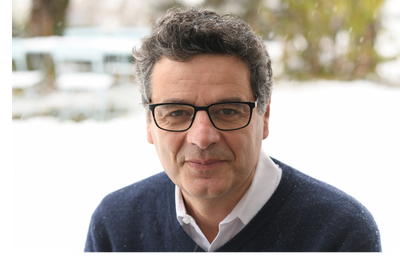 |
Petros Koumoutsakos, Harvard University Petros Koumoutsakos is Herbert S. Winokur, Jr. Professor of Engineering and Applied Sciences, Faculty Director of the Institute for Applied Computational Science (IACS) and Department Chair of Applied Mathematics at Harvard John A. Paulson School of Engineering and Applied Sciences (SEAS). He studied Naval Architecture (Diploma-NTU of Athens, M.Eng.-U. of Michigan), Aeronautics and Applied Mathematics (PhD-Caltech) and has served as the Chair of Computational Science at ETH Zurich (1997-2020). Petros is elected Fellow of the American Society of Mechanical Engineers (ASME), the American Physical Society (APS), the Society of Industrial and Applied Mathematics (SIAM). He is recipient of the Advanced Investigator Award by the European Research Council and the ACM Gordon Bell prize in Supercomputing. He is elected International Member to the US National Academy of Engineering (NAE). His research interests are on the fundamentals and applications of computing and artificial intelligence to understand, predict and optimize fluid flows in engineering, nanotechnology, and medicine. |
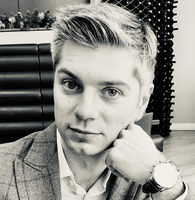 |
Oleksandr Kyriienko, University of Exeter |
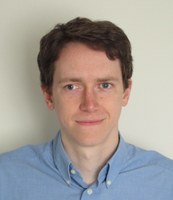 |
Ashley Montanaro, University of Bristol Ashley Montanaro has worked in the field of quantum computing for 18 years, specialising in quantum algorithms and quantum computational complexity, and has published over 50 papers on this topic. He holds a PhD in quantum computing from the University of Bristol, supervised by Prof. Richard Jozsa, has been a postdoctoral fellow at the University of Cambridge, and is now Professor of Quantum Computation at Bristol. He holds an ERC Consolidator grant and was awarded a Whitehead Prize in 2017 by the London Mathematical Society. He served on the Steering Committee of the international conference on Quantum Information Processing (QIP) from 2016-19, and was a Founding Editor of the journal Quantum. He is co-founder of Phasecraft, a quantum software startup whose goal is to get the most out of near-term quantum computers. |
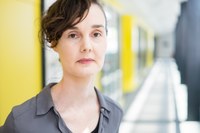 |
Catherine Powell, University of Manchester Catherine Powell obtained her PhD in Numerical Analysis from the University of Manchester Institute of Science and Technology (UMIST) in 2003. She is currently a Professor of Applied Mathematics at the University of Manchester where, amongst other things, she acts as Group Research Lead for Applied Mathematics. She is an associate editor for the SIAM Journal on Numerical Analysis as well as the SIAM/ASA Journal on Uncertainty Quantification (UQ), and was formerly a Programme Director for the SIAM UQ Activity Group (2018-2020). Powell also co-authored the graduate textbook ‘An Introduction to Computational Stochastic PDEs’ published by Cambridge University Press in 2014. Powell’s early work focused on developing efficient solvers for linear systems associated with mixed finite element discretizations of systems of partial differential equations (PDEs). Today, her work lies at the interface of numerical analysis and UQ, focusing on adaptive algorithms for solving high-dimensional PDEs with parameter-dependent (or random) inputs in engineering applications such as heat transfer, fluid flows and elasticity. Key topics include efficient computational methods for forward propagation of uncertainty in PDE models, stochastic finite element methods, adaptivity, a posteriori error estimation and preconditioned iterative solvers. |
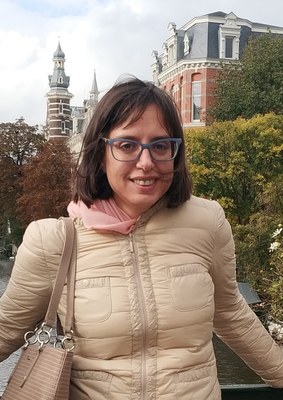 |
Laura Scarabosio, Radboud University Laura is assistant professor at the Radboud University since 2020. She obtained the PhD in Mathematics from ETH Zürich in 2016 under the supervision of Ralf Hiptmair and co-supervision of Christoph Schwab. She spent four years as postdoctoral researcher at TU Münich, when she conducted also research visits at the Oden Institute at UT Austin. Her research interests cover shape uncertainty quantification, Bayesian inverse problems, uncertainty quantification for random multiscale materials and applications to biology and medicine. |

